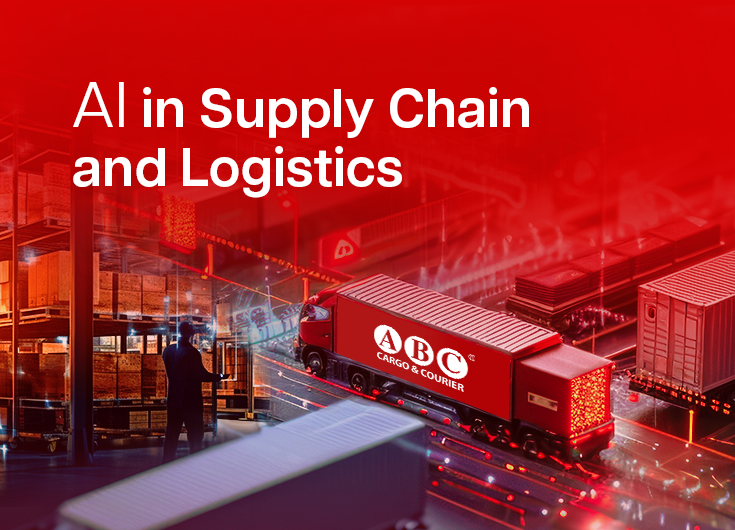AI is being used innovatively in a variety of sectors. From healthcare to manufacturing, AI has reshaped many industries and businesses continue to explore new applications and opportunities for AI-driven innovation. Through its ability to effectively sort and analyze huge amounts of data, AI has brought in financial benefits and automated repetitive monotonous tasks. One of the industries that has benefited greatly from AI is the logistics industry. From optimized route planning to enhanced warehouse management, AI has revolutionized the logistics industry.
Properties of AI Systems
AI systems learn from data. It recognizes patterns and makes predictions based on those patterns. But that is not the extent of its abilities, AI systems can solve complex problems, make decisions independently, interact with us through NLP, and generate creative ideas. The following are some of the properties of AI systems that can be applied to the supply chain and logistics sector:
- Data Analysis
- Decision-Making
- Demand Forecasting
- Prescriptive Analytics
- Machine Learning
- Natural Language Processing (NLP)
Applications of AI Systems In The Supply Chain and Logistics Sector
Some properties of AI systems have led to them being extensively used in the supply chain and logistics sector. For example, an AI system’s ability to make predictions from prior data helps logistics companies plan their inventory and transportation while avoiding stockouts. Similarly, its data analysis and decision-making properties can be applied for route optimization, ultimately finding the most efficient and cost-effective route for transportation. Apart from these, there are many other ways in which you can apply AI in logistics. We have summarized these applications for your benefit:
- Realtime Tracking
The data analysis property of AI systems lets you continuously collect and process data from various sources in real-time. This enables logistic businesses to track the location and status of shipments as they move through the supply chain. For better clarity let’s go through the process step-by-step:
- AI systems collect data from sources like GPS trackers and transportation management systems.
- The raw data is processed and made into usable data.
- The data is then presented in user-friendly formats like dashboards or maps.
- Alerts or notifications are also generated for the customer.
- Route Optimization
A combination of AI’s data analysis and decision-making properties can help optimize delivery routes and schedules. Curious how this works? Let’s break it down. AI algorithms sift through vast amounts of data related to traffic density, weather conditions, and delivery schedules. Then the most efficient route is selected leading to reduced fuel consumption, minimum transportation costs, and timely deliveries. This is especially useful when you have air freight services as the application of AI in air freight can significantly reduce costs.
- AI-Powered Inventory Management
The demand forecasting property of AI systems allows them to analyze large amounts of historical data to predict customer demand. This will help businesses manage their inventory better. For instance, it will help businesses stock the right quantity of products. This will help avoid overstocking and stockouts. Moreover, it optimizes production schedules allowing businesses to allocate resources efficiently and minimize waste.
Another potential use of the demand forecasting property is to anticipate demand fluctuations. Thus you can adjust prices, product offerings, and marketing strategies accordingly.
- Risk Management
Prescriptive analysis of AI systems can assist in risk management. Prescriptive analytics can simulate various outcomes and calculate the probability of each. This will help businesses analyze any potential risks and make informed decisions. Moreover, you can devise mitigation plans in advance with this.
- Warehouse Management
Machine learning algorithms can analyze large volumes of warehouse data and consistently learn from it. Warehouse data includes order volume, SKU movement, and picking processes and an analysis of all these metrics helps machine learning models recommend the best warehouse layouts, storage locations, and picking strategies. This will ultimately improve warehouse efficiency and reduce labor costs.
- Customer Service
Most logistics businesses, especially those offering door-to-door cargo services require a great customer service team. This is where NLP-powered AI systems can help. For instance, you can automate responses to simple, repetitive queries using this technology. NLP-powered virtual assistants can also handle order tracking and answer questions about order status or delivery times. This will lighten the burden on the customer service teams and improve customer satisfaction.
Challenges of AI in Logistics and Supply Chain
The widespread adoption and integration of AI in the logistics industry does not mean that it is without challenges. Some of the challenges to using AI in logistics and supply chain are given below:
- Data Quality – AI algorithms depend heavily on the input or data that you provide. If the quality of this data is low, the output it provides will also be ridden with inconsistencies and inaccuracies.
- Cost – The initial costs might seem daunting for small-scale businesses.
- Skill Gap – Finding and retaining employees skilled in machine learning and AI can be challenging.
- Cybersecurity Risks – AI systems are vulnerable to cyber-attacks and data breaches.
- Integration – Existing infrastructure might have to be modified or changed to accommodate AI systems.
Conclusion
In conclusion, AI has significantly impacted the supply chain and logistics sector. From real-time tracking to inventory and risk management, AI in logistics has widespread applications. With further advancements in Artificial Intelligence, the logistics industry is set to gain greater efficiency and optimization.





